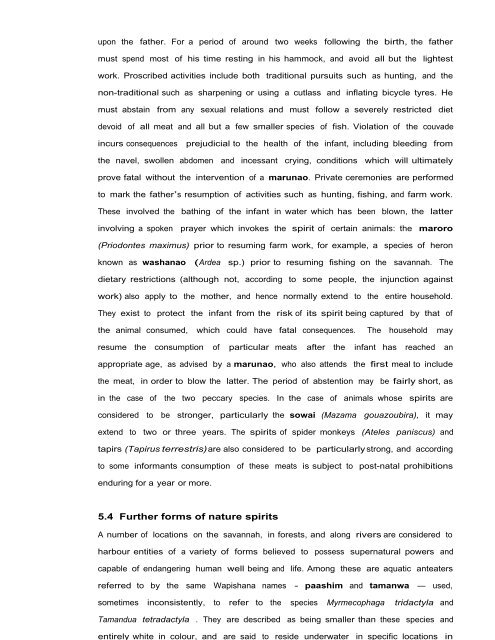Ethnoecology, Resource Use, Conservation And Development In A ...
Ethnoecology, Resource Use, Conservation And Development In A ...
Ethnoecology, Resource Use, Conservation And Development In A ...
Create successful ePaper yourself
Turn your PDF publications into a flip-book with our unique Google optimized e-Paper software.
upon the father. For a period of around two weeks following the birth, the father<br />
must spend most of his time resting in his hammock, and avoid all but the lightest<br />
work. Proscribed activities include both traditional pursuits such as hunting, and the<br />
non-traditional such as sharpening or using a cutlass and inflating bicycle tyres. He<br />
must abstain from any sexual relations and must follow a severely restricted diet<br />
devoid of all meat and all but a few smaller species of fish. Violation of the couvade<br />
incurs consequences prejudicial to the health of the infant, including bleeding from<br />
the navel, swollen abdomen and incessant crying, conditions which will ultimately<br />
prove fatal without the intervention of a marunao. Private ceremonies are performed<br />
to mark the father’s resumption of activities such as hunting, fishing, and farm work.<br />
These involved the bathing of the infant in water which has been blown, the latter<br />
involving a spoken prayer which invokes the spirit of certain animals: the maroro<br />
(Priodontes maximus) prior to resuming farm work, for example, a species of heron<br />
known as washanao (Ardea sp.) prior to resuming fishing on the savannah. The<br />
dietary restrictions (although not, according to some people, the injunction against<br />
work) also apply to the mother, and hence normally extend to the entire household.<br />
They exist to protect the infant from the risk of its spirit being captured by that of<br />
the animal consumed, which could have fatal consequences. The household may<br />
resume the consumption of particular meats after the infant has reached an<br />
appropriate age, as advised by a marunao, who also attends the first meal to include<br />
the meat, in order to blow the latter. The period of abstention may be fairly short, as<br />
in the case of the two peccary species. <strong>In</strong> the case of animals whose spirits are<br />
considered to be stronger, particularly the sowai (Mazama gouazoubira), it may<br />
extend to two or three years. The spirits of spider monkeys (Ateles paniscus) and<br />
tapirs (Tapirus terrestris) are also considered to be particularly strong, and according<br />
to some informants consumption of these meats is subject to post-natal prohibitions<br />
enduring for a year or more.<br />
5.4 Further forms of nature spirits<br />
A number of locations on the savannah, in forests, and along rivers are considered to<br />
harbour entities of a variety of forms believed to possess supernatural powers and<br />
capable of endangering human well being and life. Among these are aquatic anteaters<br />
referred to by the same Wapishana names - paashim and tamanwa — used,<br />
sometimes inconsistently, to refer to the species Myrmecophaga tridactyla and<br />
Tamandua tetradactyla . They are described as being smaller than these species and<br />
entirely white in colour, and are said to reside underwater in specific locations in


